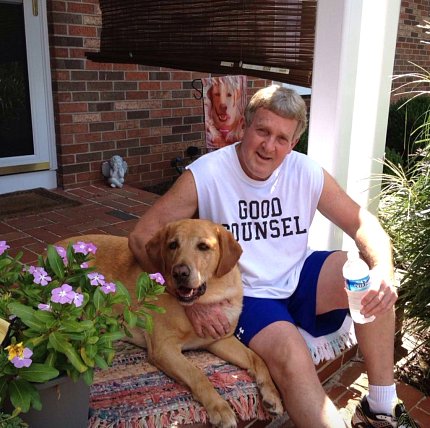Last Lap Logged
Moore Retires After 43-Year Career

Jerry Moore recently retired after a 43-year career at NIH. He served as the NIH regulations officer in the Office of Management Assessment’s Division of Management Support. In this role, Moore oversaw and managed agency regulatory activities.
“Jerry has provided our teams with expert guidance, stewardship and an unwavering commitment to deliver management excellence on regulatory matters, requirements and processes to assure regulatory compliance,” said his director, Anna Amar. “Our team in OMA will miss Jerry’s leadership and hands-on, in-the-trenches management style and work ethic, and we’re certain our colleagues and stakeholders across the Department of Health and Human Services and NIH will miss him all the same.”
Moore received his bachelor’s and master’s degrees from the University of Maryland. He first learned about NIH when he worked for the University of Maryland’s then Office of Resident Life. At the time, he was organizing a career-development program for students in his residence halls. He stumbled across an NIH vacancy announcement for a management analyst position and applied.
“It was really unexpected. I had just taken on a new role with Resident Life and had not anticipated going to NIH,” he said. “Like a lot of people, I thought, ‘I’ll be at NIH for a couple of years and see how it works out.’ It’s funny to me thinking about that 43 years later.”
At NIH, one of the first projects he completed was a pilot study to evaluate flexible workplace schedules. The study analyzed the feasibility of allowing employees to modify their work schedules based on what was most convenient for them.
“We’ve come a long way since that initial cautious test of flexible working hours,” said Moore. “At that time, the concept of allowing your employees to choose what their work schedules looked like was revolutionary.”
In his most recent role, he helped to maintain NIH regulations for the HHS secretary. Most of NIH’s regulations pertain to grant programs, peer review, standards of care for retired chimpanzees, loan repayment programs, conflict of interest and the conduct of persons and traffic on NIH’s campus. When Congress enacted new legislation that impacted NIH, Moore worked with appropriate program management and staff to ensure that necessary regulations were in place to implement the legislation .
Additionally, his office managed the NIH review of many draft regulations and guidance documents written by HHS agencies and other departments. He said,“NIH has a wealth of biomedical research-based knowledge and expertise that enables NIH reviewing offices to provide valuable advice to the other agencies and departments concerning their respective draft regulations and guidance documents.”

Moore, an avid runner for 33 years, was a longtime leader and member of the NIH Health’s Angels Running Club. Many of the people he met through the club and ran with are now scattered across the world. His active role in the club and the relationships that he developed with people across NIH enhanced his knowledge and understanding of the intramural, extramural and administrative communities and the roles they all play in helping NIH achieve its mission.
Moore enjoys coming back to campus to help with the annual NIH Institute Relay, an event that he and his teams won several times. The race brings reliable fun and good cheer to the institutes and centers. People who don’t normally mix come together to run in five-person teams.
“Runners of all skills and abilities come to the event without egos or concerns about their position or status at NIH. They are just out there having fun,” he said. “I’m proud of the role that I played in helping to make the Institute Relay a lasting tradition for the NIH community to enjoy each year.”
In retirement, Moore hopes eventually to go back to school to complete the coursework needed to finish a doctoral program in public administration he started earlier in his career and do some writing.
Recently, he accepted a part-time contract position to help support the NIH Regulations Program. “You really get attached to NIH and committed to its mission and supporting researchers and everything they do. It’s a unique agency,” he said. “It doesn’t take long for somebody new to NIH to realize this is a really special place.”
